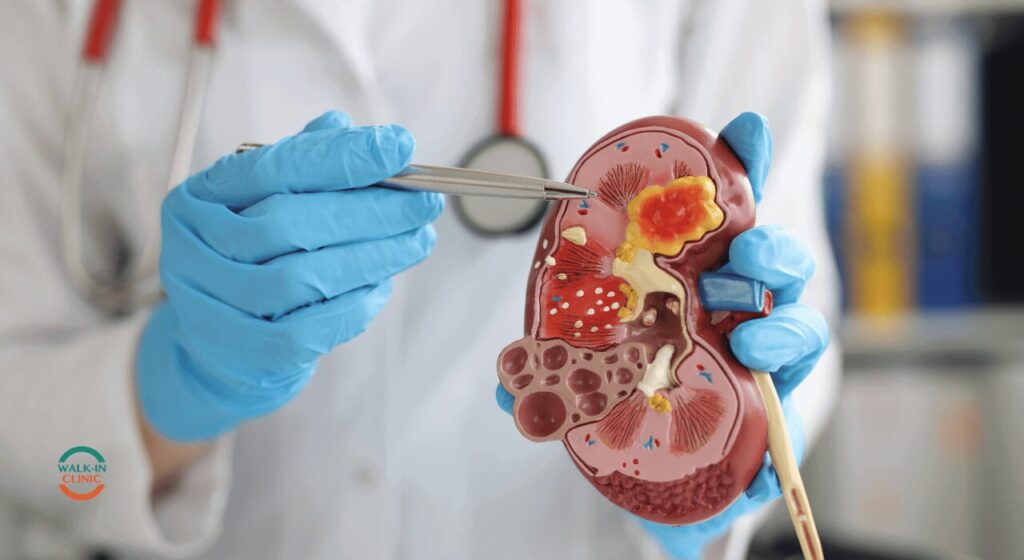The kidneys play a vital role in maintaining our overall health and well-being. These small but mighty organs filter waste products, regulate fluid balance, and produce essential hormones. Did you know that kidneys also regulate our blood pressure? However, kidney issues can arise due to various factors, potentially leading to serious health complications. We explore signs of kidney issues and provide practical tips to improve kidney function.
Several signs indicate that your kidneys might not be working at their best. However, this is not an exhaustive list, so please see a health professional immediately if you are experiencing any new urinary changes, swelling or pain.
Signs of Kidney Issues
- Changes in Urination: Any noticeable change in urination patterns, such as increased frequency, difficulty or pain during urination, dark-coloured urine, or foamy urine, may indicate kidney problems.
- Swelling: Persistent swelling, particularly in the feet, ankles, hands, or face, could signify impaired kidney function. This occurs due to the kidneys’ inability to remove excess fluids and waste from the body.
- Fatigue and Weakness: Kidney dysfunction can lead to a build-up of toxins in the bloodstream, causing fatigue, weakness, and difficulty concentrating.
- Blood in Urine: The presence of blood in urine, known as haematuria, is a common sign of kidney issues. It may be visible to the naked eye or detected through urine tests.
- Persistent Back Pain: Kidney problems can cause dull, throbbing pain in the lower back, often on one side. This pain may be accompanied by fever, nausea, or vomiting.
We can do several practical things to maintain and improve our kidney health.

Improving Kidney Function
- Stay Hydrated: Drinking an adequate amount of water helps flush out waste products and toxins from the kidneys. Aim for at least eight glasses of water / clear fluids per day (2 – 3 litres), or adjust according to your activity level and climate.
- Eat a Kidney-Friendly Diet: Incorporate foods that promote kidney health, such as leafy greens, berries, garlic, olive oil, and fish rich in omega-3 fatty acids. Avoid excessive salt, processed foods, and sugary beverages.
- Maintain a Healthy Blood Pressure: High blood pressure can damage the kidneys over time. Regularly monitor your blood pressure and, if necessary, adopt lifestyle changes such as reducing sodium intake, exercising regularly, and managing stress. If your blood pressure is consistently elevated, you must see a health professional for management.
- Exercise Regularly: Engaging in moderate-intensity exercises like walking, swimming, or cycling improves overall cardiovascular health and helps maintain optimal kidney function. Remember – a healthy heart and healthy kidneys work hand in hand!
- Limit Alcohol and Caffeine Intake: Excessive consumption of alcohol and caffeine can strain the kidneys. Moderation is key, so limit alcohol intake to moderate levels and consume caffeine in moderation.
- Avoid Smoking: Smoking damages the lungs and affects kidney health. Quitting smoking or seeking professional help to quit can significantly improve kidney function.
- Manage Chronic Conditions: Properly manage chronic conditions like diabetes and hypertension, which can damage the kidneys. Follow medical advice, take prescribed medications, and maintain a healthy lifestyle.
Taking care of our kidneys is crucial for maintaining overall health. By recognizing the signs of kidney issues and implementing healthy habits, we can enhance kidney function naturally. Remember to stay hydrated, eat a kidney-friendly diet, exercise regularly, and manage chronic conditions. Prioritizing kidney health is a step towards a healthier, happier life.
If you’re interested in testing your kidneys, this can be done with blood and urine testing. Book in to see one of our GPs if you are experiencing symptoms, or if just for your peace of mind and you do not have any symptoms, opt for one of our blood profiles. Book online or call us today.

















